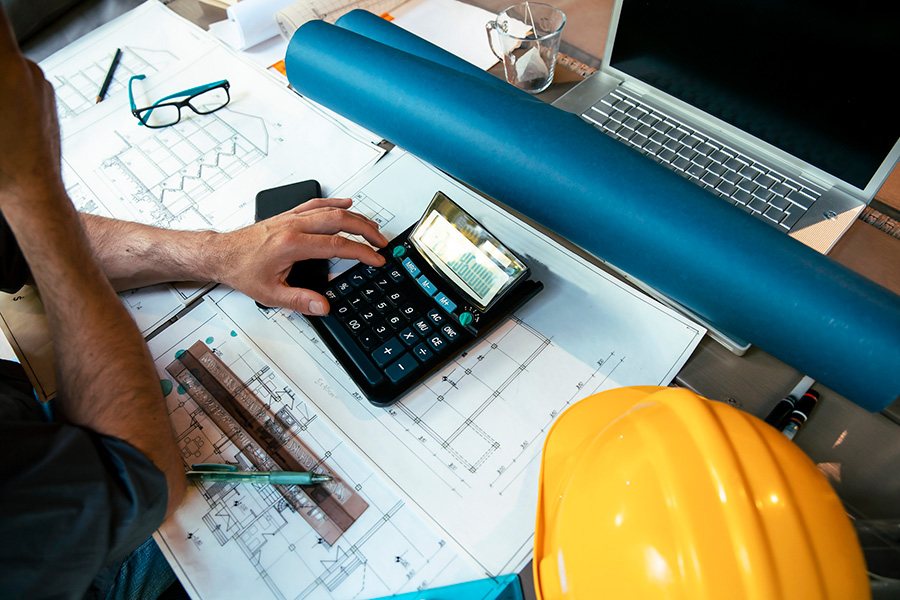Key Principles for Project Costing estimating for Preconstruction and Construction Management

In the dynamic world of construction, the ability to accurately estimate project costs is invaluable. Construction estimating is a process that requires not only a deep understanding of the project and its requirements, but also a broad perspective on a range of factors that could influence the final cost.
Mastering the art of construction estimating is a key factor in the sustained success of construction projects. Skilled construction estimators help construction companies, architects and engineers to plan effectively, bid competitively and deliver projects that satisfy clients without compromising on quality or running over budget.
What is Construction Estimating?
Construction estimating is the process of calculating the total cost to complete a particular construction project. This calculation involves several different components, such as the cost of raw materials, labor costs and equipment.
The goal of construction estimating is to come up with as accurate a cost projection as possible based on the information available at the time. The more accurate the estimate, the more likely the project is to be financially successful.
Optimizing Project Costing in Preconstruction and Construction Management
Are you involved in preconstruction or construction management? Delve into the art of precise construction estimating with these 6 essential principles. This guide is tailored to benefit professionals in preconstruction and construction management roles, providing valuable tips and real-world examples to elevate your project costing strategies. With over 40 years of experience, trust CIC for accurate cost estimates that empower your projects from the outset.
Principles of Construction Estimating
Following are six key principles of construction estimating as well as some tips (for those involved or interested in creating estimates for construction projects) and examples for each of them.
1. Understanding Project Requirements
The first step in any construction estimate is to fully understand the project’s requirements. This means going through the project plans in detail, understanding the design, the scope of work and the desired outcomes.
- Tip: Invest time in familiarizing yourself with all project documents, including plans, specs, addendums and contract terms. Regularly communicate with the design team for clarification on ambiguous details.
- Example: For the construction of a hospital, the construction estimator would not only need to understand the generic layout but also specialized requirements such as provisions for medical waste, radiation protection in radiology rooms and specific HVAC requirements.
2. Detailing Material Costs
Once the project requirements are understood, the next step is to detail the cost of the materials required. These costs include everything from concrete to steel beams and finishing materials like paint or wallpaper.
- Tip: Use historical data from past projects to inform estimates. Regularly update your pricing database and build relationships with suppliers to stay updated on market trends.
- Example: For a warehouse project, the construction estimator must accurately estimate the quantity of steel required for racking systems by working closely with the design team and suppliers.
3. Calculating Labor Costs
Labor costs are a significant portion of any construction project. The estimator needs to determine how much labor will be required for each part of the project and calculate the associated costs.
- Tip: Understand your crew’s productivity rates and consider factors such as project complexity, site conditions, and labor market conditions.
- Example: For a high-rise project, the estimator must consider the additional time needed for workers and materials to move to higher floors and factor it into the labor cost estimate.

4. Estimating Equipment Costs
Some projects may require special equipment. These costs should be included in the overall estimate.
- Tip: Don’t forget to include costs for leasing or purchasing equipment, as well as maintenance, fuel and transport costs.
- Example: In a road construction project, the estimator has to consider the cost of hiring heavy machinery like graders, asphalt pavers and compactors.
5. Factoring in Overheads and Profit
Overhead costs, such as office expenses, insurance and taxes, as well as a reasonable profit margin, should be included in the estimate.
- Tip: Overhead costs include indirect project costs such as utilities, insurance and administrative staff salaries. Profit margins should reflect the risk level associated with the project.
- Example: For the construction of a research laboratory, the estimator must consider overhead costs such as site security, as well as a higher profit margin due to the project’s specialized nature and higher risk level.
6. Accounting for Risk and Uncertainty
Every construction project has some level of risk and uncertainty. Whether it’s unexpected weather conditions, changes in market prices for materials or unforeseen site conditions, good construction estimators account for these risks in their calculations.
- Tip: Identify all potential risks and assess their possible impact. Include contingency in the estimate for unforeseen circumstances.
- Example: In a housing project, the estimator accounts for the risk of adverse weather conditions, potential permitting delays and price escalation of raw materials due to recent market volatility.
Conclusion
Accurate construction estimating is not just about crunching numbers. It’s a fine art that requires experience, expertise and a deep understanding of the many variables that can impact a project’s cost. The principles discussed here lay a strong foundation for construction professionals looking to improve their estimating skills.
Since 1983, CIC has navigated the complexities of construction projects across sectors, delivering successful results while keeping costs in line with our initial estimates. We understand that each project is unique and requires a particular approach to estimate its true cost. Our team can provide accurate cost estimates, helping you to understand what your project will entail financially and to ensure that you can plan effectively from the start. For more information about construction costs and estimates, contact us.
